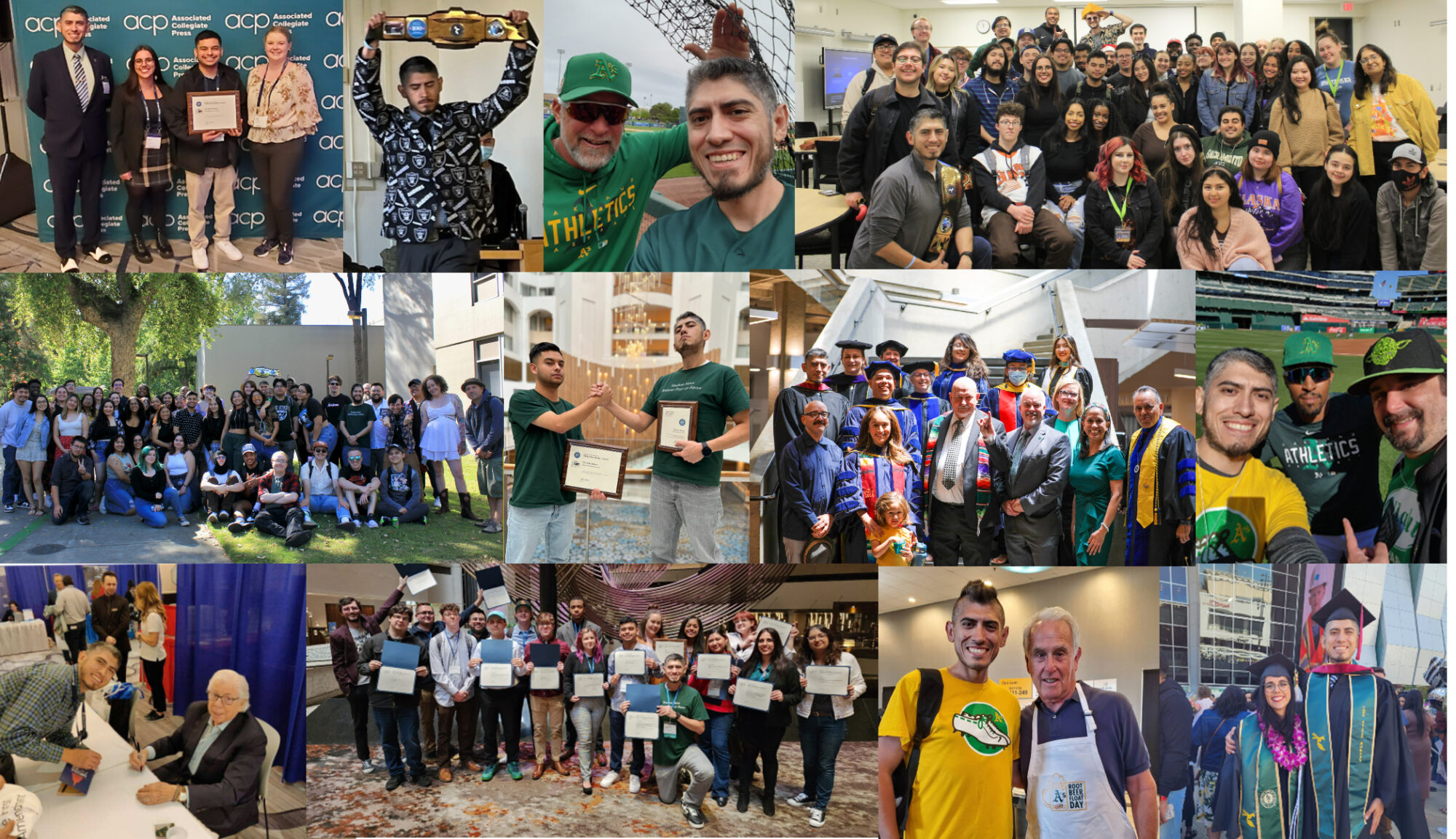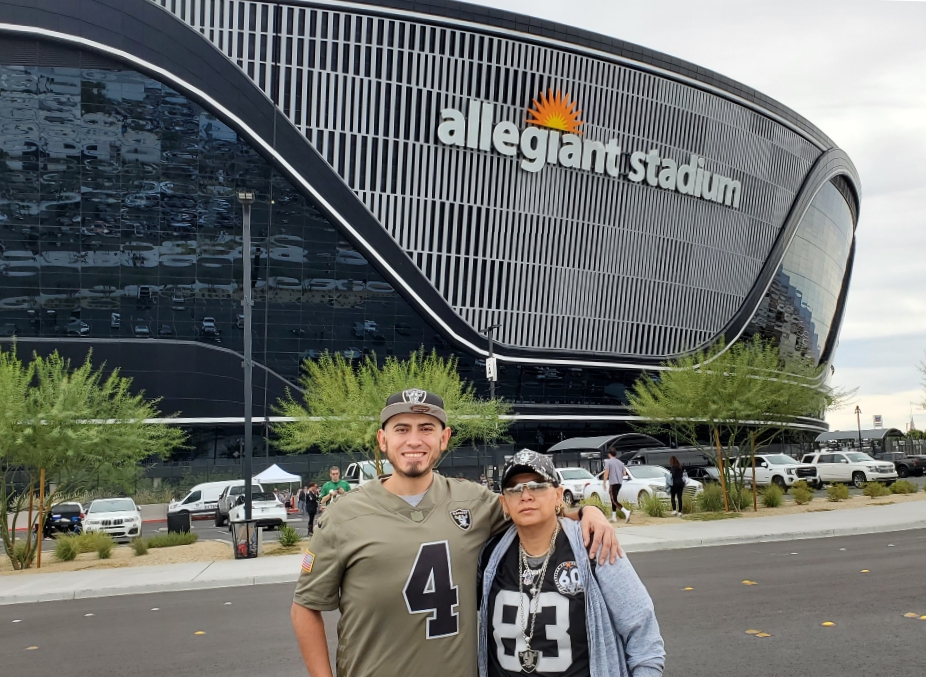I’ve toyed with the idea of this blog post for a while, but I haven’t found the will to write it. Maybe it’s the brutal subject matter. Maybe it’s the fact that (as my friend Jordan Guinn says) there’s already so much discourse; what can I possibly add?
Well, a blog shouldn’t exist if the person has nothing to say. So I guess I better say something.
More or Less
I was lucky enough to visit the “Death Star” (Allegiant Stadium) in Las Vegas last year with my sister Marie, the person I hold directly responsible for making me a Raider fan (thanks a lot). I greatly enjoyed the game, where the Raiders walloped the Eagles, and despite what you’ve heard, the opposing fan noise isn’t that bad. Is it the Coliseum? Absolutely not and it will never be. But as a former season ticket holder, I promise you, it felt like a Raider game; more or less.
But I was struck by how much Vegas has changed and how expensive the entire experience was.
This was my fourth trip to Las Vegas as an adult, and I’ve never felt more ripped off. Sure, Las Vegas has always been expensive, more or less, but this felt extreme. The tickets were the most expensive event tickets I’ve ever purchased, parking isn’t free on The Strip anymore, and a beer will cost you $10 – anywhere.
Service has also taken a major hit. When the pandemic started, casinos and hotels conducted massive layoffs. Many of those employees have moved on to other industries or other cities. But even worse, some places are purposely working with minimal crew. They’ve learned to do more, with less.
More with Less
This has been the central idea kicking around in my head for months; maybe even years. So much of the present time can be described by the principle of “more with less.” This is a quote from the TV show The Wire, which I’ll explain in a moment.
As a person who loves pop culture and discourse, I try to watch every show that’s ever been considered “The Best Show on Television” by the fancy critics at prestige publications (New York Times, Washington Post, etc.). In order for a show to qualify as the “Best Show on Television,” by the prestige critics, it must be serious (no comedies allowed); there is usually a significant crime aspect; the characters will have layers and flaws; and it will have a predominantly white cast.
As with all Hot Takes on this blog, please take that with a grain of salt. But for the last 20 years, the show dubbed as “The Best” has met the aforementioned criteria.
Alas, this is not a critique of white privilege in entertainment – that blog has definitely been done before! It’s just a statement of fact, and it’s always rubbed me the wrong way. However, one of the previous “Best Shows on TV” was The Wire, which featured many people of color in the cast. I watched the entire series and it is certainly excellent; but it is also so depressing.
If you know anything about creator David Simon, you can see where the show gets its tone; he’s as prickly as he is clever. But for me, nothing was harder to watch than the fifth and final season of The Wire. Each season focused on a different industry and the final season showcased journalism. As a former crime reporter who fled journalism for TV, Simon was all too aware of the cracks in the industry. And this was before the internet truly demolished ad revenue for newspapers.
Every good show must have a stand-in for the audience: someone who represents our point-of-view, the eyes through which we are viewing the world of the show. For Season 5, one of those stand-ins is overworked Baltimore Sun editor Augustus “Gus” Haynes. As poor exasperated Gus deals with budget cuts and layoffs, he participates in a staff meeting with executive editor James C. Whiting. Whiting announces impending layoffs with this inspiring piece of advice:
“We are, quite simply, going to have to find ways to do more with less.”
Is there a more apt description for the current world? How many of us have been asked to do more, with less? Without additional stimulus, or unemployment funds, or even hazard pay. The guidance from the CDC on Dec. 27 couldn’t have been much clearer. It’s time to get back to work: suck it up.
At the beginning of the pandemic people banged pots and pans for hospital workers; now nurses are being asked to show up to work with Covid. Essential workers were considered heroes when the pandemic started; now the bosses are wondering “why no one wants to work”.
The truth is much simpler: Americans are tired. We’re tired of being asked to do more, with less. Whether it’s the fees on your food delivery app or the price of a 12-pack of soda, prices have gone up while wages remain stagnant. Job requirements have never been stiffer, as an overeducated workforce tries to find the jobs they were promised when they took out student loans. And have you tried to find a place to rent recently?
For those of us old enough to remember the 1990s, it feels like a bad dream; like society lost the plot when 2008 happened. The housing crash and Great Recession were the start of the “More with less” era, when Americans were asked to accept less because of “the economy.” Just for a little while, it was said.
Less is More
But what happened instead? A lot of corporations realized they could get away with giving us less. All of a sudden, the bare minimum was considered acceptable. No one demanded raises anymore; everyone just hoped to avoid the next round of layoffs, so they could keep their health insurance.
Companies got really smart about passing on costs to the contractors (not employees) and customers; why run a taxi service when you could run a series of independent ride service contractors instead? By waving convenience in front of us, tech companies got us to accept all kinds of new ideas. Why not have a third-party take my food from the restaurant and deliver it to me, for enhanced fees? As if food delivery was a broken concept.
Slowly but surely, we started to receive less and being told it was more. And in the decade that followed 2008, that mentality was rewarded mightily by Wall Street. Look at the top companies based on market cap or revenue; how many of those companies would you consider “good to their employees”? How many of those companies are tech companies with questionable practices?
And to serve the shareholders, companies have cut costs and corners whenever possible. You can’t have a bad quarter, a bad revenue report, a bad anything. Netflix announced a price hike last week and added 2.5 million subscribers; but that didn’t hit an estimate (by definition something made-up and inexact), so the stock went tumbling. How does this system make sense?
The recent supply chain issues are a result of the “less is more” attitude. Companies have cut costs and employees to the point where there is no “slack” in the supply chain; there is no buffer or failsafe to make sure we don’t run out of chicken wings. A couple of factories go down, some truckers are sick, and suddenly we’ve got bare shelves. If a company can manage a skeleton crew, there’s a good chance that’s the standard. Now imagine two of those skeleton crew members get Covid-19.
Less and More
And so where does that leave us? In an accelerated game of Monopoly. Remember the last time you played Monopoly? It gets brutal pretty quick at the end, doesn’t it? You’re without money or property, and it’s all held by the richest person on the board. Feels a bit on the nose.
Where else was capitalism supposed to end? It’s an honest question. Envision a natural progression for the system of capitalism. Could it succeed? Absolutely. But you’d need rules, and that sounds too much like regulation, and corporations hate regulation.
So if you set up a capitalist system, where the stock market is made up and the regulations don’t matter, where is that supposed to end? With a benevolent tech billionaire willingly paying his taxes to keep the country going? Or something else?
It certainly feels like we’re experiencing “something else.” We’re being asked to accept a system of Less and More; where we all get less, so the billionaires can have more. No matter what metric you use, billionaire wealth has gone way up during the pandemic. Here’s one such article.
We get less; and they get more.
Less for More
So where does that leave us? Getting less for more of our money. Inflation is on the rise, and as the stock market corrects itself (i.e. drops), austerity is likely to become popular. Remember the 2009 economic disaster in Greece? That came after austerity.
Austerity will have an outsized affect on disadvantaged people, the poor and people of color. Studies have shown that when a government tightens its belt, the people on the margins suffer the most. I worry about many of my former students, who have inherited a brutal economic landscape. An economic landscape that was also considered bad when I entered the media job market in 2010.
This country needs an economic jolt for working class Americans. As manufacturing jobs disappear, workers will need new training and occupations. Who will create jobs in the Midwest? How will America revitalize the regions that have been crushed since 2008? Have you seen anyone with a real plan for these problems? Because I haven’t.
I don’t like asking these questions; but I hate the fact no one is working to solve them. I hope that will change in the near future; but until then, millions of people are left treading water, more or less.


One Reply to “More/Less”